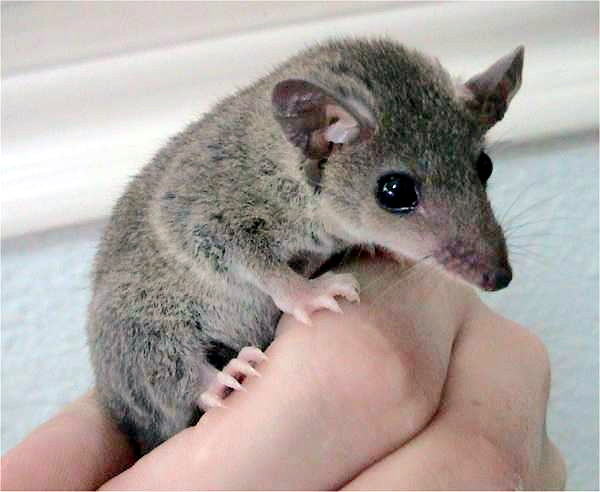In world’s first genetically engineered marsupials, scientists get a fresh window into human biology
By Megan Molteni,
STAT
| 07. 21. 2021
Photo licensed for use by CC BY-SA 2.5
When the pile of opossums arrived at John VandeBerg’s lab from the Smithsonian’s National Zoo in 1978, the geneticist had an ambitious plan for the soft-eyed, hamster-sized animals. He wanted to domesticate them to live in a lab anywhere on the planet. Mice were well and good, but imagine what biomedical insights might be lurking inside marsupials, he thought. Their young, rather than being encased inside a uterus, develop attached to a nipple in a pouch or on a belly where they’re much easier to observe.
VandeBerg succeeded, and today manages the largest Monodelphis domestica colony in the world at the University of Texas Rio Grande Valley School of Medicine. More than a dozen labs have taken up research projects with the gray short-tailed opossums, who hail from South America. But the same quirk that makes them a compelling model organism has also made them more difficult to study than he once imagined.
Shortly after ovulation, marsupial moms secrete layers of mucus and protein around their eggs, covering them in a hard...
Related Articles
By Scott Solomon, The MIT Press Reader | 02.12.2026
Chris Mason is a man in a hurry.
“Sometimes walking from the subway to the lab takes too long, so I’ll start running,” he told me over breakfast at a bistro near his home in Brooklyn on a crisp...
By Diaa Hadid and Shweta Desai, NPR | 01.29.2026
MUMBRA, India — The afternoon sun shines on the woman in a commuter-town café, highlighting her almond-shaped eyes and pale skin, a look often sought after by couples who need an egg to have a baby.
"I have good eggs,"...
By George Janes, BioNews | 01.12.2026
A heart attack patient has become the first person to be treated in a clinical trial of an experimental gene therapy, which aims to strengthen blood vessels after coronary bypass surgery.
Coronary artery bypass surgery is performed to treat...
By Staff, ScienceDaily | 01.05.2026
Scientists at UNSW Sydney have developed a new form of CRISPR technology that could make gene therapy safer while also resolving a decades-long debate about how genes are switched off. The research shows that small chemical markers attached to DNA
...




